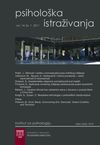Can Family Risk-Factors Moderate the Link between Psychopathy and Life-History Strategy?
Can Family Risk-Factors Moderate the Link between Psychopathy and Life-History Strategy?
Author(s): Janko MeđedovićSubject(s): Psychology, Health and medicine and law, Family and social welfare
Published by: Филозофски факултет, Универзитет у Београду
Keywords: psychopathy; family risk-factors; Life History Theory;
Summary/Abstract: Life History Theory is an explanatory evolutionary framework which explains differences in fitness-relevant outcomes using the characteristics of the environment and individual organisms. Basically, individuals can be positioned somewhere on the r/K continuum of the Life History Strategy (LHS): a K or slow strategy represents later maturity and reproduction, a smaller number of offspring with higher investment in them, while the r (or fast) strategy follows the opposite pattern. Previous research offered evidence that psychopathy can represent a trait associated with fast LHS. In the present research we examined the relations between the family risk-factors, a four-factor model of psychopathy and the LHS in a sample of male convicts (N=181). The results have shown that a manipulative and deceitful interpersonal style is associated with slow LHS while shallow affect and antisocial tendencies are related to fast LHS. The interactions between psychopathy and family risk-factors revealed that parental criminal behaviour enhances the relation between fast LHS and psychopathic traits, including the manipulative interpersonal style. The findings are in accordance with the Life History Theory and provide a deeper understanding of the preservation of psychopathy in contemporary populations.
Journal: Psihološka istraživanja
- Issue Year: 19/2016
- Issue No: 1
- Page Range: 23-34
- Page Count: 12
- Language: English

